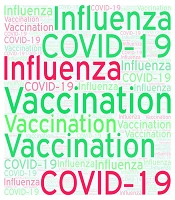While the omicron variant of COVID-19 is decreasing worldwide, experts are concerned about the added risk of a difficult flu season in the upcoming autumn. Two mathematical models predict a big rebound in the number and severity of flu cases in 2022-23. This is because the last year's flu season failed to show up, as public health measures to control COVID-19 seem to have had the added benefit of stopping the flu. Although both analyses have been posted to the medRxiv preprint server and have not yet been peer-reviewed, they have come to the same conclusion that the flu could make a comeback this year (1).
In the worst-case scenario, the CDC estimates 8,000,000 to 17,000,000 cases of flu, which may lead to 3,700,000 to 6,100,000 medical visits, 82,000 to 17,000 hospitalizations, and 5,000 to 14,000 deaths (2).
Waning natural immunity in public due to last year's missing flu season could make people, especially young children, more likely to get the virus. Usually, a combination of natural immunity and vaccination helps tamp down seasonal influenza. The new mathematical models predict that the vaccination rate would need to rise to about 75% to avoid extra hospitalizations. However, even a 10% increase in vaccination rates could reduce hospitalizations by 6% to 46%, depending on the dominant strains (1).
Usually, the southern hemisphere flu season, from February to August, helps show what the northern hemisphere can expect over the coming winter. However, with strict COVID-19 measures and limits on international travel still in place in countries like Australia and New Zealand and much of South America, it has been another record-low year for flu infections (1).
It is vital that as many people as possible get vaccinated during the upcoming flu season, especially children with almost no natural immunity to the virus. So, the vaccine is our best weapon against the flu, especially for the most at-risk groups.
The CDC recommends that everyone six months or older get the flu shot, with few exceptions (1). However, in the Iranian national flu guideline, flu vaccination is recommended for immunocompromised patients, healthcare workers, diabetic patients, hematological malignancy patients on chemotherapy or radiotherapy, ESRD patients, morbid obesity patients, asthmatic patients, pregnant women, and children between six months and six years (3).
Hence, it is concerning that we will have a very substantial influenza season coming up this year, very different from our two previous seasons, and we know this virus is now spreading out in the community. It is gathering speed already. It looks to me to be about a month early (3).
The last two flu seasons were unusually mild, with experts saying that COVID social distancing helped curb the spread of the flu. As social distancing and safety measures such as masking are relaxed, it could be easier for the flu to spread this year. Flu cases are also rising in the southern hemisphere - a reliable forecast for flu season in the northern hemisphere (3).
To sum up, we highly recommend flu vaccination, especially in the upcoming season, for immunocompromised patients, children, pregnant women, and the elderly.
